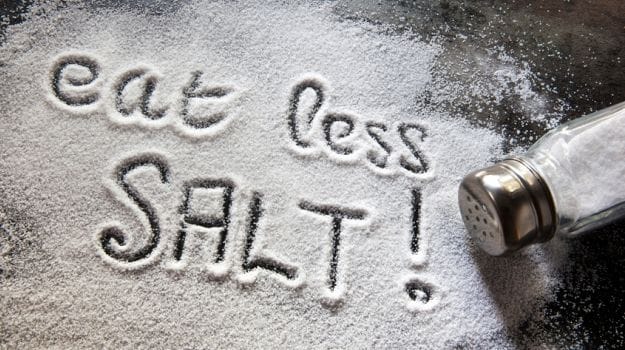
here is a salt paradox.On the one hand you’ve got Thomas Frieden, director of the U.S. centers for disorder manage putting forward within the magazine of the american clinical association that lowering salt consumption will store loads of lots of lives, and warning that ninety percentage of american citizens eat an excessive amount of of it.but then there are the epidemiologists whose research appears to factor in the different course. They song the connection between salt and deaths from coronary heart attacks and strokes, and their research suggest that while heavy salt eaters did die quicker, there may be little obtrusive danger from the average American’s intake. it truly is normally expressed as 3,four hundred milligrams of sodium in line with day, that is more or less the amount in a teaspoon and a half of salt. (Salt and sodium intake are proportional, on the grounds that salt is the primary supply of dietary sodium.)Salt isn’t always a rising fitness scourge. U.S. salt consumption has been protecting consistent for decades, and is ready the same as the global average.the paradox has an answer, that is that salt is safe inside a selection. it is reasonable to expect that decreasing the common endorsed consumption will pull many human beings at the excessive cease into a more fit variety. And so lives might also indeed be stored thanks to the U.S. food and Drug administration’s new hints, launched ultimate week and aimed particularly at lowering sodium in packaged meals and restaurant food.what is no longer but established is whether or not each person else needs to reduce, or how tons. The FDA’s new endorsed most is two,300 milligrams consistent with day. the yank coronary heart association recommends a fair decrease quantity, 1,500 milligrams, although that function is becoming increasingly more untenable.some years ago, the Institute of medication prepare a panel to evaluate the available proof. It observed none in favor of recommending consumption of less than 2,300 milligrams a day. There have been even recommendations inside the facts that consuming less might be dangerous.Rutgers college professor of medication Brian Strom, who headed the panel, has informed me in numerous preceding interviews that the premise of the heart association’s advice is “no longer completely rational.”What it’s far, in effect, is a zero-tolerance coverage. that’s because 1,500 milligrams is the minimum quantity of sodium it’s feasible to eat whilst ingesting enough meals to sustain yourself. that is, if you devour nothing with added salt, you may nonetheless get about 1,500 milligrams from the sodium that takes place naturally in safe to eat vegetation and animals.0 tolerance of salt comes from a counterproductive stage of caution. It starts with a actual clinical statement that ingesting a variety of salt increases blood stress and poses a hazard to humans with high blood pressure. Then it takes a jump of logic through assuming that if less sodium is right for those oldsters, then the less the higher for everyone.but salt isn’t always a dietary evil. The need for salt is embedded deep in human biochemistry. Salt inside the bloodstream separates into charged ions – the premise of mobile strength storage and the drivers of the complicated circuitry of the nervous gadget. With salt playing such an critical function, it makes experience that too little or an excessive amount of will kill us.The query is where that wholesome range lies. The medical network’s conventional suggestions came out of an extraordinary awareness on blood stress. but a marvel got here when researchers started out to appearance as a substitute at overall cardiovascular health. A 2014 study that tried to hyperlink salt intake immediately to dying from heart disorder and stroke, as an instance, showed that the lowest demise charge took place for individuals who consumed between 3,000 and six,000 milligrams a day. that would placed the average American’s intake sample in a safe range.nobody need to change their conduct based totally on a unmarried take a look at, but different studies have also observed the bottom loss of life rate in a similar middle range.Given the dangers of excessive blood strain, it appears unexpected that humans didn’t start dying till they were given as much as the excessive intake of 6,000 milligrams a day. Professor Michael Alderman of the Albert Einstein college of medication has talked about that different elements, which includes genes, stress and obesity can contribute to a breakdown inside the frame’s capability to maintain everyday blood pressure. Salty food may additionally exacerbate the hassle while not having been the number one motive.He also questions the idea that no viable harm can come from a very-low-salt weight loss program. some studies have hinted that such diets would possibly raise triglyceride – a hazard element for heart ailment. vitamins researcher David McCarron is quoted in the new york instances saying that going under three,000 milligrams is “dangerous”.Strom, who headed the Institute of drugs panel, doesn’t purchase this. He has mentioned that within the take a look at displaying a better death price amongst the ones ingesting the least salt, it could not had been the dearth of salt that brought about the deaths. rather, people in that institution can be ingesting very-low-sodium diets due to the fact they have been recognized with health issues, or virtually eating less meals altogether because they are unwell. He informed me that he consumes approximately 2,three hundred milligrams due to the fact he is lucky enough to have a partner who chefs.it is perfectly reasonable that there’s some leeway inside the wholesome variety – that evolution could have made it feasible for humans to thrive with out being best. There will also be enormous man or woman variations in that secure range.the best information is that FDA’s recommendations are not likely to purpose any harm to purchasers. The thought might inspire the food industry to tone down the ones closely salted soups, chips, baked goods, salads and so forth. That alternate may not positioned all and sundry in chance of salt deficiency.whether or not such changes will reduce the pride of ingesting is a matter of flavor. some people think salty processed and rapid meals is delicious. i would argue that homemade meals is delicious — unless someone provides an excessive amount of salt.










